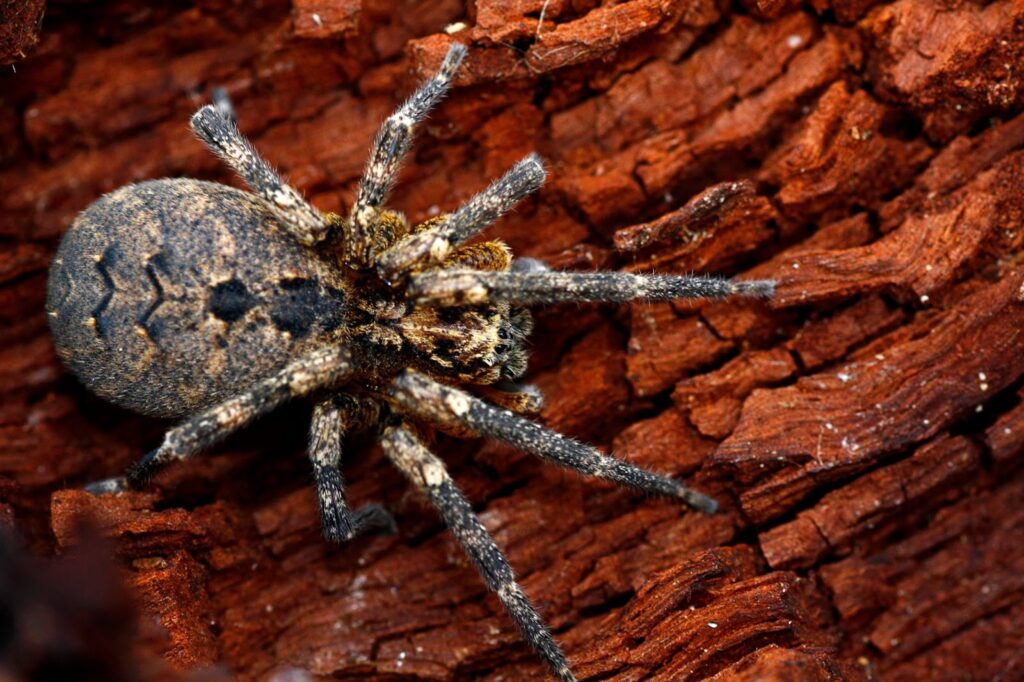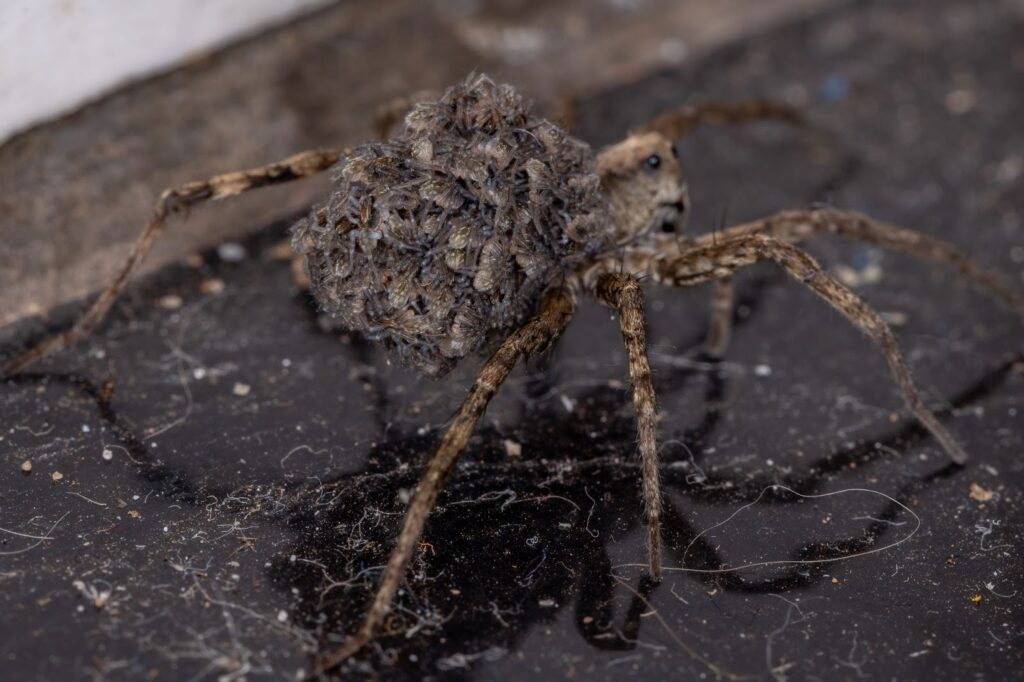Titusville’s warm, humid climate isn’t just a haven for astronauts heading to space; it’s also prime real estate for Florida’s many eight-legged residents, including the wolf spider.
If you’ve spotted one darting across your floor or lurking in the shadows, you might be wondering, are wolf spiders dangerous?
Whether you’re dealing with one wolf spider or a house full of creepy crawlers, we’ve got the facts you need to stay calm and protect your home.
Florida’s warm and humid climate creates a nearly year-round spider season, with noticeable spikes in activity during late summer and early fall. This is due to rising humidity and increased insect activity, which draws these spiders indoors in search of food and mates.
Seasonal Patterns of Wolf Spiders
Summer (June–August): Heat and humidity amplify insect populations, prompting wolf spiders to hunt more actively near homes.
Late Summer & Fall (August–October): As mating season sets in, male wolf spiders wander indoors in search of mates; this period is often the most noticeable for homeowners.
What Attracts Wolf Spiders in the House?

If yIf you’ve been playing a not-so-fun game of “spot the spider” in your home, you may be asking, what attracts wolf spiders in the house? Understanding what draws them indoors can help you prevent future visits.
Here’s what might be enticing them:
- Other Pests: Wolf spiders are hunters, not web builders. If your home has an abundance of insects like ants, flies, moths, or even house spiders, it’s like an all-you-can-eat buffet for a wolf spider.
- Clutter: Piles of boxes, clothing, or yard debris provide perfect hiding spots for these spiders.
- Easy Entry Points: Cracks in walls, poorly sealed windows, or gaps beneath doors are invitations for these stealthy invaders.
- Outdoor Lighting: Lights at night attract insects, which in turn attract wolf spiders looking for dinner.
As you might have guessed from the list above, taking steps to reduce insects inside and seal up entry points can go a long way in lowering your odds of an unwelcome arachnid encounter.
Are Wolf Spider Bites Poisonous?
First things first, are wolf spider bites poisonous? The short answer is no. Wolf spiders are not considered medically dangerous to humans. Their venom, while meant to subdue prey, is not potent enough to harm us beyond a mild reaction.
A wolf spider bite might cause slight redness, swelling, or itchiness, similar to a mosquito bite. Rarely, some individuals could experience an allergic reaction, but those cases are uncommon.
Unlike other spiders like the black widow or brown recluse, wolf spiders are not aggressive and will only bite if provoked.
Their default mode when faced with a human? Run away as fast as their eight legs can carry them.
Bite Safety Comparison
- Wolf Spider: Mild pain, redness, swelling—rarely medically significant.
- Black Widow: Neurotoxic bite, severe pain, muscle cramps, may require treatment.
- Brown Recluse: Can cause necrotic lesions, slow healing, and medical intervention.
Spider Control Tips for Florida Homeowners
Here’s a homeowner-friendly checklist to help to deter and get rid of spiders for good:
| Preventive Action | Description |
| Seal cracks & gaps | Use caulk around doors, windows, and utility openings to block entry. |
| Minimize clutter | Keep garages, patios, and storage areas tidy—spiders love dark, undisturbed hiding spots. |
| Reduce outdoor lighting | Use yellow or sodium vapor “bug lights” and motion-activated lighting to avoid attracting insects—and the spiders that hunt them. |
| Trim vegetation and debris | Clear weeds, leaf litter, and mulch close to your house to eliminate spider harborage near entry points. |
| Lower moisture | Use dehumidifiers or increase ventilation in damp areas like garages and closets. |
| Use natural deterrents | Consider sprays or sachets with peppermint, eucalyptus, lemon, cinnamon, or vinegar around windows, doors, and other entry zones. |
Quick Homeowner Checklist
- Seal all holes and cracks around your home’s exterior.
- Keep lighting minimal or use insect-safe bulbs.
- Declutter high-risk zones like garages and patios.
- Ensure proper ventilation to reduce moisture indoors.
- Use natural repellents like peppermint or citrus around entryways.
When to Call for Wolf Spider Control Services

Sometimes, keeping wolf spiders out of your home requires more than just tidying up or spraying bug repellent.
At Orange Pest Control, we specialize in wolf spider control services in Titusville and throughout Brevard County, FL. Here’s how we can help:
- Professional inspection to locate spider entry points and hiding spots in your home.
- Comprehensive treatment plans targeting spiders and the insect food sources that attract them.
- Long-term prevention strategies to reduce the chances of spider infestations in the future.
Why Choose Orange Pest Control?
If DIY prevention isn’t enough, Orange Pest Control stands out because of:
- Family-safe and eco-friendly treatments tailored to local concerns.
- Same-day service, giving homeowners immediate reassurance.
- Neighborhood expertise, with specific insights into spider behavior in Central Florida settings.
Our team serves all of Brevard County, FL, including neighborhoods like Merritt Island, Cocoa Beach, and Palm Bay. Schedule your consultation today and keep your home spider-free!
Say Goodbye to Wolf Spiders
Your home should be a haven for you and your family—not for wandering spiders. If wolf spiders are overstaying their welcome, it’s time to call in the pros!
Book your wolf spider control services today with Orange Pest Control, Titusville’s trusted partner in pest management.
Our team serves all of Brevard County, FL, including neighborhoods like Merritt Island, Cocoa Beach, and Palm Bay. Schedule your consultation today and keep your home spider-free!
Did You Know?
Wolf spiders have incredible night vision! Their eyes shine brightly when illuminated by a flashlight, which is thanks to a reflective layer called the tapetum lucidum in their eyes. This adaptation makes them highly skilled nighttime hunters—but it’s also a great way to spot them if you suspect they’re nearby.
Wolf Spiders Are Helpful Too!
Though unsettling, wolf spiders are natural pest controllers—eating cockroaches, flies, mosquitoes, and other small critters that invade homes. It’s a balance: you appreciate their role but still want them out of your living space—and that’s perfectly reasonable.
FAQ
Are wolf spiders dangerous to pets?
Wolf spiders are generally not harmful to pets. Their venom isn’t potent enough to cause damage, but curious pets could have mild reactions if bitten.
How do I keep wolf spiders out of my home?
Remove clutter, seal cracks and gaps around your home, reduce outdoor lighting, and keep insect populations under control. This will discourage wolf spiders and their prey from entering your home.
Do wolf spiders live in groups?
No, wolf spiders are solitary hunters. If you spot more than one in your home, it’s likely due to favorable conditions like abundant prey or hiding spots.
Are wolf spiders active during the day or night?
Wolf spiders are nocturnal, meaning they do most of their hunting at night. Keep an eye out for their glowing eyes if you’re inspecting dark areas outdoors!
Can I manage a wolf spider problem on my own?
While DIY solutions can help reduce sightings, professional pest control services like those provided by Orange Pest Control offer the expertise and targeted treatments necessary for long-term control.
Are wolf spiders dangerous to my children or pets?
No—bites are rare and typically mild. Keeping play areas clean and sealing homes is the best defense.
Are chemical treatments necessary?
Only if spider activity persists. Most concerns can be addressed through preventive measures and natural repellents.
Will using deterrent scents harm the environment or pets?
No. Essential oils and kitchen staples like vinegar or lemon are safe, low-impact options—but avoid direct skin contact with pets.
